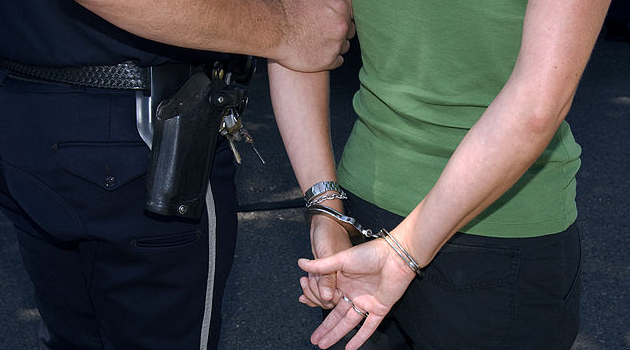
<a href="http://www.shutterstock.com/pic-94806160/stock-photo-condom-in-the-pocket-of-blue-jeans.html?src=pp-photo-97103474-Ki0yeWobyb5rgQFhzAYZfg-6">Africa Studios</a>/Shutterstock
Last week, Mother Jones‘ Molly Redden wrote about a recent Human Rights Watch report, “In Harm’s Way,” which argues that aggressive policing in New Orleans is contributing to the city’s soaring HIV/AIDS rates. One tactic that Human Rights Watch found to be particularly problematic: the police harassment of suspected sex workers for possessing condoms.
At the heart of the matter is the vague definition of the crime of “loitering for prostitution,” which invites arbitrary arrests and discriminatory policing. According to the report, police in New Orleans use the possession of condoms as evidence of prostitution, even if they don’t witness the crime underway. The result? Of the report’s 169 interviewees, all of whom had exchanged sex for money, drugs, or life necessities, more than a third said that they had carried fewer condoms out of fear of police harassment. More than a quarter had had unprotected sex due to the fear of carrying condoms.
Testimonies in the report describe police harassing sex workers, threatening arrest based on condom possession, and, in some cases, confiscating the condoms altogether. Transgender women reported the police calling them a “thing,” a “whore,” and “a disgrace to America” while searching them for condoms. Cleo, a 36-year-old woman, said, “In the French Quarter [in March of this year] I was at [a bar] with a man and the cops asked only the trans women to go outside and they searched us. If we had condoms we got arrested for attempted solicitation.”
New Orleans isn’t the only place where Human Rights Watch has documented condom confiscation. Last year, the organization examined the police treatment of sex workers in San Francisco, New York, Los Angeles, and Washington, DC, and found that police in all four cities were using condoms as evidence of prostitution.
From last year’s report, “Sex Workers at Risk”:
Police use of condoms as evidence of prostitution has the same effect everywhere. Despite millions of dollars spent on promoting and distributing condoms as an effective method of HIV prevention, groups most at risk of infection—sex workers, transgender women, and lesbian, gay, bisexual, and transgender (LGBT) youth—are afraid to carry them and therefore engage in sex without protection as a result of police harassment. Outreach workers and businesses are unable to distribute condoms freely and without fear of harassment as well.
Over the past year, some places have made progress. In June, New York became the first state to pass a law prohibiting the use of condom possession as evidence of prostitution-related crimes. In Washington, DC, the Metropolitan Police started distributing “condom cards” and leaflets to sex workers and community health groups (Example text: “Individuals are allowed to carry as many condoms as they want. There is no ‘three condom rule'”). In February, the Presidential Advisory Council on HIV/AIDS identified the usage of condoms as evidence of prostitution as one of several “HIV-specific criminal laws” that are “fueling the epidemic rather than reducing it.”
Whether or not the New Orleans Police Department will act on the report remains up in the air. Last week, dozens of people in New Orleans marched in front of City Hall holding signs saying “Prevention Not Punishment.” A New Orleans Police Department spokesperson has told local media that “to date, we have no record of the allegations made in this report.”














